After seven years of living and working across major Canadian cities, a 30-year-old Indian-origin bank advisor finds himself at a crossroads — torn between a stable life abroad and an urgent desire to return to India to be closer to his aging parents. Armed with a diploma in Business Management, a globally recognized SHRM-CP certification in Human Resources, and six years of professional experience across banking, HR, sales, and management, the advisor — who holds an Overseas Citizen of India (OCI) card — has been actively planning his return to India (R2I) for over a year. But despite consistent efforts, he’s hit a familiar wall: no job offers and minimal responses.
“I’ve revised my resume countless times, reached out to recruiters, and applied to HR, banking, and admin roles using an India-based number — still, nothing. Maybe my salary expectations are too high?” he questions. His desired range of ₹60,000–85,000 per month (₹7.2–10.5 lakh per annum), once deemed reasonable by peers, now seems to be a possible barrier. The deeper motivation behind his return, however, is personal. “My parents are in their 60s and while they’re okay now, past health scares made me realize how important it is to be near them,” he says. “Canada’s healthcare is not what it used to be — it’s expensive and slow. I can’t bring my parents here, nor do I want to. I want to raise my future children with Indian values, in a society that respects elders.”
In a Reddit post that has since sparked a lively discussion, he cites increasing racial bias in workplaces, a sense of cultural isolation, rising hate crimes, and the mental toll of immigrant life as key reasons behind his decision. “I’ve lived in Toronto, Calgary, and Saskatoon. Weather is harsh, costs are spiraling, housing is unaffordable, and I don’t see long-term growth here. Canada doesn’t feel like home anymore.” His frustration mirrors a broader trend among NRIs eyeing a return to India — a process that’s often emotionally driven but logistically complex.
“You’re just hitting typical R2I hurdles”
Reddit users offered a dose of reality. One user wrote: “You’re not doing anything wrong; you’re just hitting typical R2I hurdles. Indian companies prefer candidates already in India who can join quickly. Being abroad is a red flag, no matter your experience.” Many echoed similar advice: lower salary expectations, tweak the resume to match Indian standards (1–2 pages, direct and role-focused), and use local job portals like Naukri, iimjobs, and Hirect instead of relying solely on LinkedIn.
Others noted that Canadian HR experience holds little value in the Indian context due to vast differences in labour laws and workplace culture. “You’ll need to build local credibility first,” one user pointed out. Another commented: “There are too many qualified Indian candidates already. From an employer’s perspective, hiring someone from abroad is an unnecessary risk.” Some urged him to consider delaying the move until he builds a larger financial cushion. “Save a few crores, finish your degree, and think about setting up a business after returning,” one user advised. “The longer you wait, the harder it will be once you’re married with children.”

